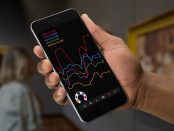[dropcap style=”font-size:100px;color:#992211;”]C[/dropcap]ontrol aversion—the urge to rebel against control over one’s decisions—can be explained by connectivity between two regions of the brain as well as behavioural measures of distrust and lack of understanding, according to a study of university students published in JNeurosci.
Individual differences in control aversion are well documented and can interfere with important decisions, such as whether or not to vaccinate a child. To understand what drives these differences, Sarah Rudorf, Daria Knoch and colleagues had participants play a game in which they divided money between themselves and another player, who could decide to restrict the participant’s choice by asking for a minimum amount. Participants were informed that they would be compensated based on a randomly selected trial.

The urge to rebel against control over one’s decisions is associated with the connectivity between parietal and frontal brain regions (shown in colour). The stronger the synchronous activation was in these regions, the more likely were the participants to show defiant behaviour. Credit: Sarah Rudorf
Connectivity between the parietal lobule and dorsolateral prefrontal cortex predicted the average difference in the chosen allocation level between the free choice and controlled conditions. Control aversion was also predicted by participants’ reported feelings about the other player’s trust in them and understanding of the other player’s request for a minimum amount of money. By combining a social decision-making task with real consequences, this neuroimaging research provides new insight into the influence of choice restriction on personal decisions.
Source: ScienceDaily

Naila Scargill is the publisher and editor of horror journal Exquisite Terror. Holding a broad editorial background, she has worked with an eclectic variety of content, ranging from film and the counterculture, to political news and finance.





















